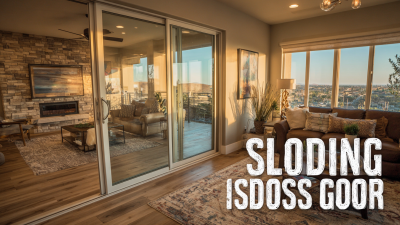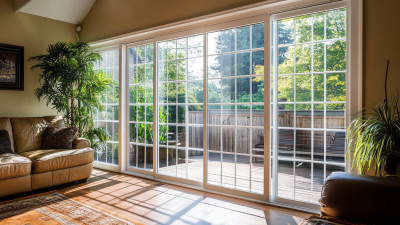Understanding the Benefits of Energy Efficient Window Replacements for Your Home
When considering home improvements, one of the most impactful upgrades is energy-efficient window replacements. According to the U.S. Department of Energy, windows account for 25% to 30% of residential heating and cooling energy use. By upgrading to energy-efficient windows, homeowners can reduce energy bills by an average of 12% to 25%, as reported by Energy Star. These replacements not only enhance the aesthetic appeal of a home but also contribute to increased comfort and energy savings, with some studies indicating a potential return on investment of up to 70%. In an era where energy conservation is becoming increasingly critical, understanding the benefits of window replacements is essential for homeowners looking to make informed decisions that promote sustainability and long-term financial savings.

Key Reasons to Consider Energy Efficient Window Replacements
Replacing your windows with energy-efficient models can significantly enhance your home's comfort and reduce energy costs. One key reason to consider this upgrade is the potential for substantial energy savings. Energy-efficient windows are designed to minimize heat loss in winter and keep your home cool in summer. This means less reliance on heating and cooling systems, resulting in lower utility bills over time.

Another important aspect is the environmental impact. By opting for energy-efficient windows, you contribute to reducing your carbon footprint. Modern windows often feature advanced materials and technologies, such as low-E coatings and argon gas fills, which help maintain indoor temperatures without undue reliance on energy. This shift not only helps with personal savings but also aligns with broader sustainability goals.
Tips: When considering window replacements, it’s advisable to look for options with the ENERGY STAR label, as this can ensure higher efficiency. Additionally, seek out local contractors who specialize in energy-efficient installations; they can provide valuable insights and assistance with any rebates or incentives available. Investing in quality installation is essential, as even the best windows will underperform if not fitted correctly.
How Energy Efficient Windows Can Lower Your Energy Bills
Upgrading to energy-efficient windows can significantly impact your home's energy bills by reducing heating and cooling costs. Traditional windows often allow heat to escape during the winter and permit it to enter in the summer, leading to increased reliance on HVAC systems. Energy-efficient windows are designed to minimize these losses, utilizing advanced technologies such as low-E coatings and multiple panes to improve insulation. As a result, homeowners can enjoy a more stable indoor climate while noticing a decrease in monthly energy expenses.
Tips for choosing energy-efficient windows include looking for the ENERGY STAR label, which indicates that the product meets strict efficiency standards. Additionally, consider double or triple-glazed options for enhanced insulation. Finally, ensure proper installation by hiring professionals, as even the best windows can fail to perform if not installed correctly.
Furthermore, regularly maintaining your windows can prolong their efficiency. Check for any gaps or cracks that may allow air infiltration and seal them to maintain optimal performance. By taking these steps, homeowners can maximize their savings and enjoy a more comfortable living space year-round.
Benefits of Energy Efficient Window Replacements
This chart demonstrates the average annual energy savings achieved by replacing traditional windows with energy-efficient models, based on different climate zones in the United States.
Understanding the Different Types of Energy Efficient Windows Available
When considering energy-efficient window replacements, it's crucial to understand the various types available on the market. Double-glazed windows, for example, consist of two layers of glass with a space in between filled with argon gas, offering significant insulation. According to the U.S. Department of Energy, replacing single-pane windows with double-glazed alternatives can reduce energy bills by 10-25%. These windows not only prevent loss of heat during the winter but also keep homes cooler in the summer, resulting in year-round comfort.
Another option worth exploring is Low-E (low-emissivity) glass windows, which have a special coating that reflects heat back into the home during colder months and keeps it out during the warmer months. The Environmental Protection Agency (EPA) states that homes using Low-E glass can save an average of 15% on their annual energy costs. Furthermore, selecting energy-efficient windows with a high Energy Star rating ensures that you're investing in a product certified for superior performance, contributing to a more sustainable living environment while enhancing the comfort and aesthetic appeal of your home.
Tips for Choosing the Right Energy Efficient Windows for Your Home
When considering energy-efficient window replacements for your home, it’s essential to understand the various options available and how they can benefit your living space. Enhanced insulation can significantly reduce energy consumption, leading to lower heating and cooling costs, which is particularly relevant as temperatures continue to rise. Many homeowners in Taiwan are now opting for innovative solutions like honeycomb shades that not only provide insulation but also add aesthetic value to their interiors.
When choosing the right energy-efficient windows, consider the following tips. First, look for windows that have a high Energy Star rating, which indicates they meet specific energy efficiency standards. Second, consider the materials; vinyl or fiberglass frames typically offer better insulation than aluminum. Lastly, don't overlook the importance of the glass type; double or triple-pane windows filled with argon gas can dramatically improve energy efficiency. By focusing on these factors, you can make informed decisions that enhance your home's energy performance.
Environmental Benefits of Upgrading to Energy Efficient Windows
Upgrading to energy-efficient windows not only enhances the comfort of your home but also offers substantial environmental benefits. These windows are designed to minimize energy loss, which significantly reduces the demand for heating and cooling. By lowering your household's energy consumption, you contribute to reduced greenhouse gas emissions, helping to combat climate change. Moreover, energy-efficient windows typically use sustainable materials and advanced technologies that support resource conservation.
When considering new windows, look for products with the ENERGY STAR label, which indicates adherence to strict energy performance standards. Additionally, consider installing windows with low-emissivity (Low-E) coatings. These coatings reflect harmful UV rays while retaining indoor heat during the winter months and keeping your home cool in the summer.
Tips for choosing the right energy-efficient windows include assessing the climate in your area and selecting windows that offer the best insulation properties. It's also helpful to consult with a professional to evaluate your home's specific needs and determine the most cost-effective options. By making informed choices, you can contribute to a greener planet while enjoying the long-term savings on your energy bills.

Related Posts
-

Mastering Global Trade Credentials for Windows and Sliding Doors Procurement
-

Unmatched Quality of Best House Windows from Leading Chinese Manufacturers
-

Solutions for Enhancing Energy Efficiency in Commercial Window Replacement Projects
-

7 Best Practices for Sliding Door Replacement to Enhance Home Value
-

The Ultimate Guide to Achieving the Best Sliding Glass Door Installation for Your Home
-

The Ultimate Guide to Choosing the Best Sliding Glass Door Replacement for Your Home


